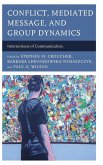Approaches to Conflict
Theoretical, Interpersonal, and Discursive Dynamics
Herausgeber: Lewandowska-Tomaszczyk, Barbara; Croucher, Stephen M.; Wilson, Paul A.
Approaches to Conflict
Theoretical, Interpersonal, and Discursive Dynamics
Herausgeber: Lewandowska-Tomaszczyk, Barbara; Croucher, Stephen M.; Wilson, Paul A.
- Gebundenes Buch
- Merkliste
- Auf die Merkliste
- Bewerten Bewerten
- Teilen
- Produkt teilen
- Produkterinnerung
- Produkterinnerung
This volume investigates the role of communication and emotions in conflict contexts and draws from communication and media studies, public relations, philosophy, psychology and neuroscience, linguistics, business studies, political science, literature, and cultural studies.
Andere Kunden interessierten sich auch für
![Grassroots Approaches to Community-Based Peacebuilding Initiatives Grassroots Approaches to Community-Based Peacebuilding Initiatives]() Kawser AhmedGrassroots Approaches to Community-Based Peacebuilding Initiatives138,99 €
Kawser AhmedGrassroots Approaches to Community-Based Peacebuilding Initiatives138,99 €![Rhetorical and Critical Approaches to Public Relations II Rhetorical and Critical Approaches to Public Relations II]() Robert L Heath / Elizabeth Toth / Damion Waymer (ed.)Rhetorical and Critical Approaches to Public Relations II303,99 €
Robert L Heath / Elizabeth Toth / Damion Waymer (ed.)Rhetorical and Critical Approaches to Public Relations II303,99 €![Approaches to Specialized Genres Approaches to Specialized Genres]() Approaches to Specialized Genres196,99 €
Approaches to Specialized Genres196,99 €![Computational and Cognitive Approaches to Narratology Computational and Cognitive Approaches to Narratology]() Computational and Cognitive Approaches to Narratology225,99 €
Computational and Cognitive Approaches to Narratology225,99 €![Post-Narratology Through Computational and Cognitive Approaches Post-Narratology Through Computational and Cognitive Approaches]() Post-Narratology Through Computational and Cognitive Approaches234,99 €
Post-Narratology Through Computational and Cognitive Approaches234,99 €![Dialectical Approaches to Studying Personal Relationships Dialectical Approaches to Studying Personal Relationships]() Dialectical Approaches to Studying Personal Relationships198,99 €
Dialectical Approaches to Studying Personal Relationships198,99 €![Conflict, Mediated Message, and Group Dynamics Conflict, Mediated Message, and Group Dynamics]() Conflict, Mediated Message, and Group Dynamics125,99 €
Conflict, Mediated Message, and Group Dynamics125,99 €-
-
-
This volume investigates the role of communication and emotions in conflict contexts and draws from communication and media studies, public relations, philosophy, psychology and neuroscience, linguistics, business studies, political science, literature, and cultural studies.
Hinweis: Dieser Artikel kann nur an eine deutsche Lieferadresse ausgeliefert werden.
Hinweis: Dieser Artikel kann nur an eine deutsche Lieferadresse ausgeliefert werden.
Produktdetails
- Produktdetails
- Verlag: Lexington Books
- Seitenzahl: 262
- Erscheinungstermin: 16. Juni 2017
- Englisch
- Abmessung: 235mm x 157mm x 19mm
- Gewicht: 535g
- ISBN-13: 9781498535458
- ISBN-10: 1498535453
- Artikelnr.: 47882124
- Herstellerkennzeichnung
- Libri GmbH
- Europaallee 1
- 36244 Bad Hersfeld
- gpsr@libri.de
- Verlag: Lexington Books
- Seitenzahl: 262
- Erscheinungstermin: 16. Juni 2017
- Englisch
- Abmessung: 235mm x 157mm x 19mm
- Gewicht: 535g
- ISBN-13: 9781498535458
- ISBN-10: 1498535453
- Artikelnr.: 47882124
- Herstellerkennzeichnung
- Libri GmbH
- Europaallee 1
- 36244 Bad Hersfeld
- gpsr@libri.de
Barbara Lewandowska-Tomaszczyk is full professor of English language and linguistics and head of the Department of Research into Language, Literature, and Translation at the State University of Applied Sciences. Stephen M. Croucher is professor and head of the School of Communication, Journalism, and Marketing at Massey University. Paul A. Wilson is professor in the Department of English Language and Applied Linguistics at the University of Lodz.
Contents Chapter 1 - Introducing Approaches to Conflict Chapter 2 - A
Conflict Model of Communication Theory John E. LaMuth Chapter 3 - Changes
in conflict over time: A longitudinal examination of conflict style
approaches Stephen M. Croucher Chapter 4 - How do emotions impact
conflicts? A neuroscientific perspective François Bogacz & Olga M. Klimecki
Chapter 5 - The Role of Shame in Conflict: A cross-cultural Perspective
Paul A. Wilson Chapter 6 - Adolescent girls in China: Managing conflicts in
gender role expectations Kara Chan, Yu Leung Ng, Jingjie Zhang, and Zhijuan
Chen Chapter 7 - Goal vs. relationship-based negotiation: A comparative
study between American, Chinese, and Polish negotiators Michä Chmielecki
and ¿ukasz Sükowski Chapter 8 - Discourse, cognition, ideology:
Critical-cognitive perspectives on ideological positioning and conflict
dynamics in political discourse space Piotr Cap Chapter 9 - Macro and micro
argumentative structures in intercultural conflict: Discourse Analysis Olga
L. Antineskul and Tatiana M. Permyakova Chapter 10 - The foreigner, our
fellow human being: The discursive means used in reports published in the
Polish press to 'humanize' immigrants Maria Holubowicz Chapter 11 -
Intergroup conflict, WTC and CA: Minority and majority groups Diyako
Rahmani Chapter 12 - Communicating emotions related to racial identity
issues: A case study Ewa Bogdanowska-Jakubowska Chapter 13 - Standing
alone: The long lasting consequences of Ijime and the need for diversity
training" Alberto M. Albuquerque About the Editors and Contributors
Conflict Model of Communication Theory John E. LaMuth Chapter 3 - Changes
in conflict over time: A longitudinal examination of conflict style
approaches Stephen M. Croucher Chapter 4 - How do emotions impact
conflicts? A neuroscientific perspective François Bogacz & Olga M. Klimecki
Chapter 5 - The Role of Shame in Conflict: A cross-cultural Perspective
Paul A. Wilson Chapter 6 - Adolescent girls in China: Managing conflicts in
gender role expectations Kara Chan, Yu Leung Ng, Jingjie Zhang, and Zhijuan
Chen Chapter 7 - Goal vs. relationship-based negotiation: A comparative
study between American, Chinese, and Polish negotiators Michä Chmielecki
and ¿ukasz Sükowski Chapter 8 - Discourse, cognition, ideology:
Critical-cognitive perspectives on ideological positioning and conflict
dynamics in political discourse space Piotr Cap Chapter 9 - Macro and micro
argumentative structures in intercultural conflict: Discourse Analysis Olga
L. Antineskul and Tatiana M. Permyakova Chapter 10 - The foreigner, our
fellow human being: The discursive means used in reports published in the
Polish press to 'humanize' immigrants Maria Holubowicz Chapter 11 -
Intergroup conflict, WTC and CA: Minority and majority groups Diyako
Rahmani Chapter 12 - Communicating emotions related to racial identity
issues: A case study Ewa Bogdanowska-Jakubowska Chapter 13 - Standing
alone: The long lasting consequences of Ijime and the need for diversity
training" Alberto M. Albuquerque About the Editors and Contributors
Contents Chapter 1 - Introducing Approaches to Conflict Chapter 2 - A
Conflict Model of Communication Theory John E. LaMuth Chapter 3 - Changes
in conflict over time: A longitudinal examination of conflict style
approaches Stephen M. Croucher Chapter 4 - How do emotions impact
conflicts? A neuroscientific perspective François Bogacz & Olga M. Klimecki
Chapter 5 - The Role of Shame in Conflict: A cross-cultural Perspective
Paul A. Wilson Chapter 6 - Adolescent girls in China: Managing conflicts in
gender role expectations Kara Chan, Yu Leung Ng, Jingjie Zhang, and Zhijuan
Chen Chapter 7 - Goal vs. relationship-based negotiation: A comparative
study between American, Chinese, and Polish negotiators Michä Chmielecki
and ¿ukasz Sükowski Chapter 8 - Discourse, cognition, ideology:
Critical-cognitive perspectives on ideological positioning and conflict
dynamics in political discourse space Piotr Cap Chapter 9 - Macro and micro
argumentative structures in intercultural conflict: Discourse Analysis Olga
L. Antineskul and Tatiana M. Permyakova Chapter 10 - The foreigner, our
fellow human being: The discursive means used in reports published in the
Polish press to 'humanize' immigrants Maria Holubowicz Chapter 11 -
Intergroup conflict, WTC and CA: Minority and majority groups Diyako
Rahmani Chapter 12 - Communicating emotions related to racial identity
issues: A case study Ewa Bogdanowska-Jakubowska Chapter 13 - Standing
alone: The long lasting consequences of Ijime and the need for diversity
training" Alberto M. Albuquerque About the Editors and Contributors
Conflict Model of Communication Theory John E. LaMuth Chapter 3 - Changes
in conflict over time: A longitudinal examination of conflict style
approaches Stephen M. Croucher Chapter 4 - How do emotions impact
conflicts? A neuroscientific perspective François Bogacz & Olga M. Klimecki
Chapter 5 - The Role of Shame in Conflict: A cross-cultural Perspective
Paul A. Wilson Chapter 6 - Adolescent girls in China: Managing conflicts in
gender role expectations Kara Chan, Yu Leung Ng, Jingjie Zhang, and Zhijuan
Chen Chapter 7 - Goal vs. relationship-based negotiation: A comparative
study between American, Chinese, and Polish negotiators Michä Chmielecki
and ¿ukasz Sükowski Chapter 8 - Discourse, cognition, ideology:
Critical-cognitive perspectives on ideological positioning and conflict
dynamics in political discourse space Piotr Cap Chapter 9 - Macro and micro
argumentative structures in intercultural conflict: Discourse Analysis Olga
L. Antineskul and Tatiana M. Permyakova Chapter 10 - The foreigner, our
fellow human being: The discursive means used in reports published in the
Polish press to 'humanize' immigrants Maria Holubowicz Chapter 11 -
Intergroup conflict, WTC and CA: Minority and majority groups Diyako
Rahmani Chapter 12 - Communicating emotions related to racial identity
issues: A case study Ewa Bogdanowska-Jakubowska Chapter 13 - Standing
alone: The long lasting consequences of Ijime and the need for diversity
training" Alberto M. Albuquerque About the Editors and Contributors








